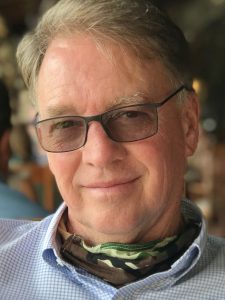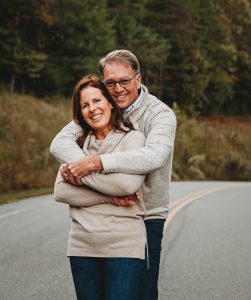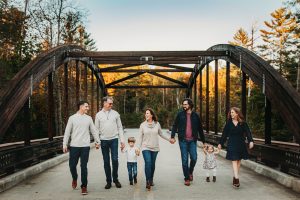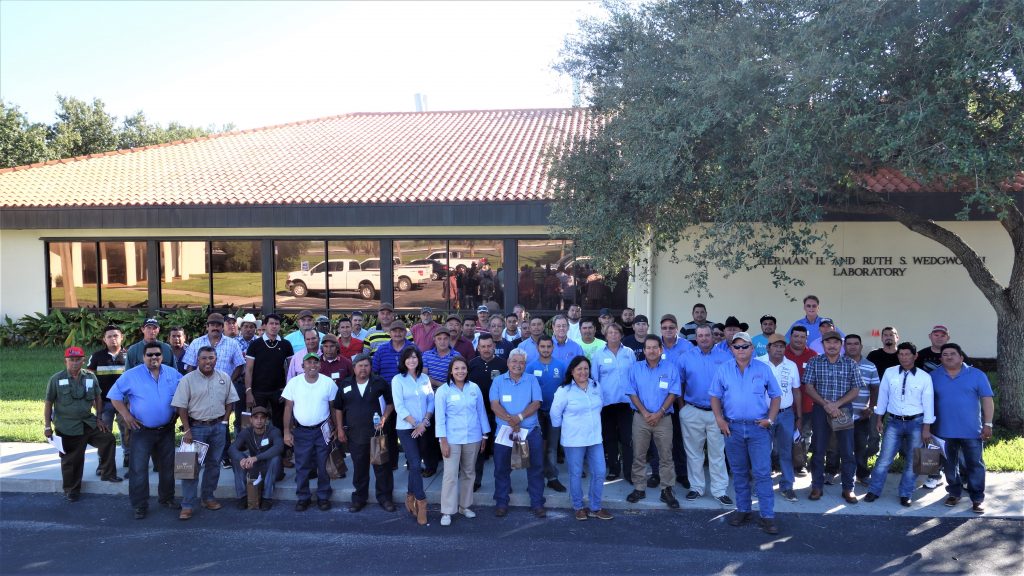
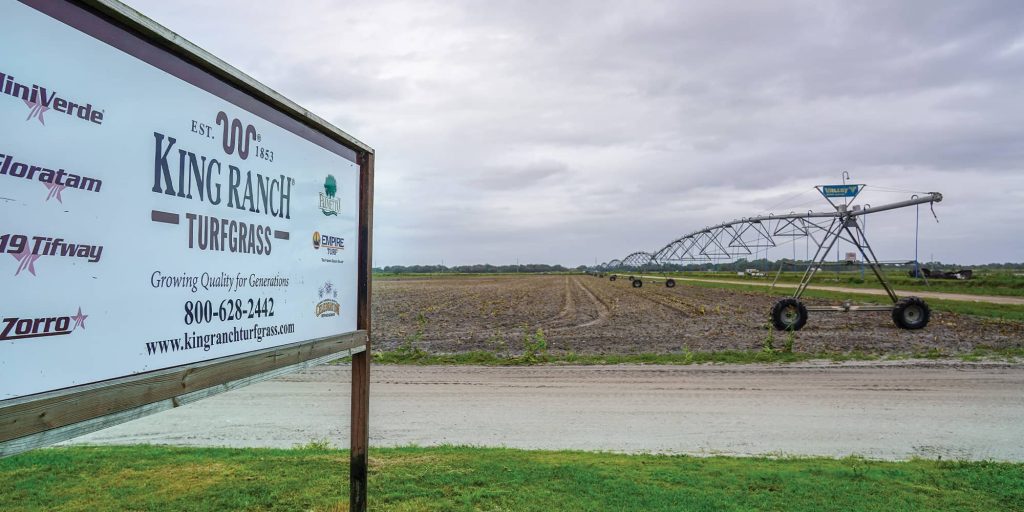
Paul Grose Reflects on Almost 40 Years at King Ranch
Paul Grose, the Vice President of King Ranch Florida Operations shares his journey into the company and his role in operations.
Grose grew up as a preacher’s kid. He was born in New Hampshire but spent his early childhood traveling with his family in South East Asia as missionaries of the Methodist Church. They went from Malaya (prior to being Malaysia) to Singapore and after four years ended up in Texas.
He graduated high school in Austin, Texas and went on to study Ranch Management at Texas A&M. Prior to going to college he spent some time working on his grandfather’s farm located near Claxton, Georgia. Grose shared that this formed his initial interest in agriculture that would carry forth for the rest of his life.
While at Texas A&M, Grose took a semester off and went to work on a ranch in Colombia that was owned by his uncle who lived in Florida.
“I went there for the experience, to learn the language and to work on a ranch,” he said.
He became fluent in Spanish and gained hands-on work in South America. After college, Grose went back to work for his grandfather, who wasn’t ready to retire although he was in his late 70s. While working again on the Georgia farm, he decided he would go back to graduate school for a master’s degree in Ranch Management.
“I wanted to pursue a career internationally in ranch management, so I applied to work for King Ranch,” Grose said. “It took me ten months to get an interview.”
At first, King Ranch told him they didn’t really have anything for him to do. Grose asked them if he were to go to South America, what experience would make him a valuable employee for them in the future. So, hearing that, they offered him a job and sent him to Venezuela in May of 1983. He even missed his master’s graduation ceremony to get there as quickly as possible.
He remembers landing and driving for several hours in the pouring rain before arriving at a big ranch house where everyone was already asleep. Grose woke and had breakfast with the president of the company and some other employees, starting the first of many experiences working for King Ranch.
Grose became the manager of that ranch, where he was for two and a half years. There were five King Ranch locations in Venezuela at the time, and although he worked near the coast, he would travel between the ranches. After that, he was sent to work for a King Ranch cattle and Quarter Horse operation in Brazil.
After a few months into the new job, Grose decided he should either forget about his girlfriend back in Venezuela or marry her. So, he went back to Venezuela, asked Lenoska to marry him over Christmas of 1985 and the two were happily married six weeks later on Valentine’s Day in 1986.
“It was a quick romance, we’d only met one another ten months prior to our wedding,” he said.
Together, they went to Brazil where Grose was the interim manager for a year.
“Some of my best memories are probably working as a cowboy in South America, being able to experience working in a different environment and culture. Many people have a romanticized view of life of a cowboy or cowgirl and I got to do that for four years,” he said.
After Brazil, Grose returned to the United States, straight to the King Ranch headquarters in Texas. The current King Ranch President and Chief Executive Officer, Robert J. Underbrink, called Grose during that time and asked if he would move from Texas to Florida to oversee their brand new turfgrass operations that needed help.
“I thought about it for a couple of days and took him up on his offer. In March 1987, we moved to Florida,” he said.
At that time, King Ranch had 1,900 acres of newly established turfgrass. Some of it had not even been harvested the first time. Grose hadn’t seen the organic muck soils of South Florida before he took this position.
“Going from livestock production into turfgrass production was an interesting change but a lot of the same principles apply, such as soil fertility and fertilization, plant growth – these types of things were all a part of my training,” he said.
Grose became heavily involved in turfgrass trade associations and was eventually asked to take on more responsibility by becoming General Manager for the King Ranch Florida Farm in the 1990s.
He took on oversight of their turfgrass, sugarcane, rice, sweet corn and a variety of crops. From there he was asked to not only produce muck-grown crops also manage crops on sand land where their citrus groves had gone out of production due to disease.
When they moved to Florida in 1987, Lenoska was pregnant with their first son, Andrew and then in 1989 they had their second son, Brian while living in Belle Glade. While the boys were young toddlers, King Ranch sent Grose back to Brazil where they were changing ranch management where he’d worked before. The family was only there for a few months before returning to his role in Florida.
King Ranch history
King Ranch was established in 1853 in South Texas by Captain Richard King. King was a steamboat captain. When the Union blockaded Texas cotton during the Civil War, he would travel over the land between South Texas and Mexico. He became familiar with the land in South Texas and decided to buy property and start hiring people to establish his ranch.
Grose said that the current ownership includes sixth-generation descendants of Captain King. King Ranch continues to grow, recently acquiring a turfgrass farm in South Texas and almond and pistachio operations in California.
“When I was hired with King Ranch in 1983, we had somewhere between 6 and 7 million acres around the world. King Ranch had properties in Texas, Florida, Venezuela, Brazil, Argentina, Spain, Morocco and the largest acreage was in Australia,” Grose shared.
But over time, the King family members decided to divest in some of those foreign operations and repatriate the capital. By 2000, King Ranch had withdrawn from all foreign operations, with the last one being in Brazil.
Industry observations
“The turfgrass industry is quite dynamic. It’s a forward-looking industry. We deal with not only production issues and new varieties but we also deal with environmental constraints,” Grose said.
Turfgrass farms use scientific methods for crop production, and responsible use of fertilizer is important. Grose said there is a public perception of how turfgrass is managed and that’s an important aspect of marketing their products and industry. He explained that in Florida there is a lot of attention on use of water and fertilizer, not only in the production of turfgrass but also in the end destination whether it be for a lawn or a golf course.
Grose loves his job because of his ability to work outside and produce something that he sees develop and grow every day. He shared that it’s rewarding to see a crop of good value and quality meet the needs of a customer. He explains grass is not only aesthetically pleasing for a consumer to enjoy and relax on in their yard, a park or on a golf course, but it also benefits the environment.
“Grass has a cooling effect on the environment, acts as a filtration device for stormwater, helps trap dust and reduces noise in urban environments,” he said. “Knowing we are producing a crop that’s beneficial to the consumer and urban environment is wonderful.”
Growth ahead
“We’re a diversified company, in terms of the crops we grow also geographically. It really takes a lot of people working together to manage these different crops through the year because they have different crop cycles and needs for land preparation and cultural activities” Grose shared.
He also manages equipment sharing among the different crop managers.
“An operation like this takes a lot of teamwork and our people are good at what they do and work hard to contribute to the success of each other. And that’s what we have,” he said.
Grose said although there is a lot of competition between sod growers, it is important they continue to interact socially and through their trade organizations to understand and work better together as they face industry challenges. He said together they can adopt new technologies to meet the challenges of an everchanging marketplace.
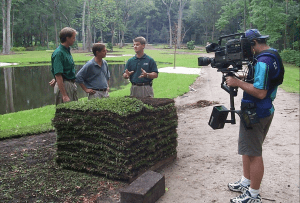
Vice President of King Ranch Florida Operations, Paul Grose (left), discusses grass varieties with Sod Solutions President, Tobey Wagner (right) in the early 2000s.
“It’s important to see each other, interact and support each other,” he said. “We need to have solidarity with other farmers, but also with other crop production managers and agricultural enterprises, not just in turfgrass, because agriculture needs to stick together just like turfgrass needs to stick together.”
Grose explained how turfgrass production in the Palm Beach County area is very important to the local economy and King Ranch generates a lot of jobs in the area.
“We are an important part of the local turfgrass production in our community. We are also a customer to local vendors such as fertilizer dealers, equipment dealers and chemical suppliers,” he said.
Since the 1960s, King Ranch has been a strong presence in the area and the agricultural industry for the South Florida region.
In May, Grose will have been with the company for 38 years. Looking ahead, he said King Ranch will continue to grow in not only turfgrass production, but also in sugar cane, sweet corn, rice, citrus and other crops. He manages about 26,000 acres in South Florida as the Vice President and General Manager of King Ranch Florida Operations.
“We will continue to look for diversified production systems and operations in different parts of the country and of the world,” he said.
This article was written by Cecilia Brown.

